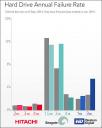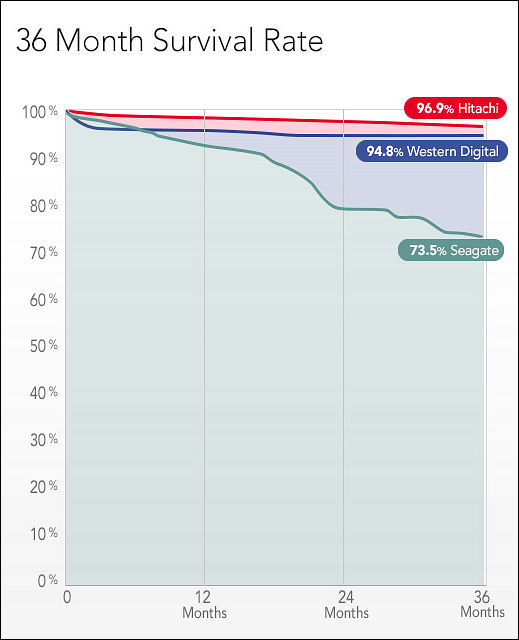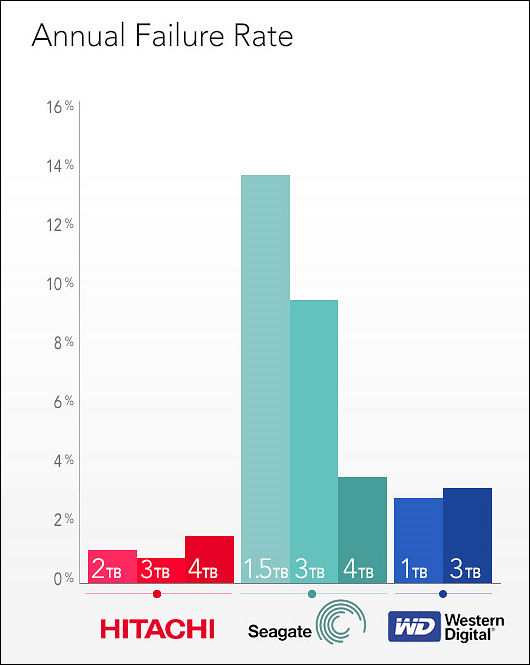
-
Hmmm... Seems Hitachi must have been desperate to shake off IBM's disastrous hard drive failure debacle when IBM sold its hard drive division to Hitachi about 2001.
I had the infamous IBM 75GXP Deskstar otherwise known as the 'Deathstar'.
http://en.wikipedia.org/wiki/HGST_Deskstar
Worse piece of shit ever made! Last about one month before it failed. No joy from IBM or the supplier!
-
Of course, their sample group for Seagate is quite a bit larger than WD. That's probably relevant.
-
Interesting. It's fun to see how things have changed over the years. I used to work for a company that was using HDDs in a product. We were using Hitachi, Maxtor, Seagate and Quantum.
Hitachi drives were just OK. Some failures, but we didn't decide to use them.
Quantum was the worst. 20 drives came in a box. 5 drives wouldn't even work out of the box. Another 5 would fail during cloning and installation. Another 5 would eventually fail before 3 months.
The Maxtor drives weren't much better. You might get 1 or 2 fail out of the box, with 1-3 fail during cloning and installation. Maybe another 1 would fail in 3 months.
Seagate was bulletproof. All drives worked out of the box, all lasted 3 months or more. I still have 2 of these drives running 13 years later..
We did some initial testing with WD drives but they weren't much better than Hitachi at the time.
It's interesting to see how WD and Hitachi have become the best, while Seagate bought Maxtor and became one of the worst..
-
Worrisome, I use a lot of Seagates!
-
Seagate recently had an incident where a large batch of 1TB drives would eventually stop working. It turns out it was the firmware on the drive controller itself. The logging data had a date that was offset and the date would simply run out of space so the drive would freak out and put itself into a kind of safety mode. The problem is that once it did that, it was no longer accessible in any way without doing a UART connection directly to the main ASIC chip and resetting the defaults and then updating the firmware. The problem is that this wasn't doable by the average person and Seagate took forever to even acknowledge the problem, and then their solution was to send the person another drive instead of fixing the old one, which still had their data intact.. It was a huge mess.
-
I find it the most amusing that no solution exist for reliable data storage. And few guys are working in this direction.
Personally I would buy storage that is one time writable and can store information for long time not fearing impacts, sun and water.
-
I did a test with CD-R types. Most will erase or get errors in full sun in a matter of minutes if the dye is left facing the light. Some would last minutes, some hours. The black plastic CD-Rs would last a lot longer than any of the others.. I still wouldn't trust them to last forever though.
-
I do not mean CD-R or DVD-R. This things can be only some secondary backups as they are hardly predictable. I mean something really strong with small information density, but one that can't be destroyed.
-
DNA is an excellent medium, but the read/write times are just terrible..
-
DNA is an excellent medium, but the read/write times are just terrible..
It is not. :-) At least in the terms I defined.
-
@svart Back in 2001 when IBM's GXP Deskstar series drives were failing in droves IBM claimed the problem was a firmware issue. It wasn't. It was hardware related.
There were so many drive failures that IBM ended up RMA'ing drives and many received replacement drives that had previously already failed and arrived DOA. In other words IBM was replacing faulty drives with faulty drives!
A class action lawsuit against IBM began but it dragged on for years with IBM claiming the GXP Deskstar failures rates were not above the norm. (I never knew 'the norm' could be close to 100%)
In the end they settled by paying $100 to each owner of a failed GXP but never admitted responsibility.
Anyway it was such an unmittigated disaster for IBM they sold their entire hard drive division to Hitachi!
-
Anyway it was such an unmittigated disaster for IBM they sold their entire hard drive division to Hitachi!
IBM also had big research center dedicated to magnetic recording and drives, it also went to Hitachi and later had been highly "optimized" and as I understand it hardly exist now. It is one of the reasons of progress slowdown that followed.
-
Maybe they know how to make a hard drive that is rain and earthquake and nuclear war resistant and lasts forever, but they'd go out of business.
Morals of the story:
- the whole economic system is flawed and
- buy two drives and keep two simultaneous backups of everything
-
Maybe they know how to make a hard drive that is rain and earthquake and nuclear war resistant and lasts forever, but they'd go out of business.
I am not talking about HDDs.
buy two drives and keep two simultaneous backups of everything
And this is very dangerous advice as it is enough to buy two drives from same batch and.. bad thing can happen in one day. Normal advice is to always have three copies - on local computer, on separate home server and on distant backup service. And all must be backed up on daily schedule.
-
Really? I wonder what the mathematical probability is that two separate backup drives fail simultaneously. Even if they come from the same batch, it would seem to me that the probability would be fairly low. Your backup advice is better, but how many people actually do backups daily?
-
I wonder what the mathematical probability is that two separate backup drives fail simultaneously. Even if they come from the same batch, it would seem to me that the probability would be fairly low.
Problem here that calculate probability here is very hard as they are not independent (for two drives) and you really do not know any necessary data.
I personally saw drives from same batch failing in one day.
It help big (with backup :-) ) if you saw any firm inside that have lots of HDDs.Your backup advice is better, but how many people actually do backups daily?
Anyone who have any valuable data and some grey cells. On work documents folder it is better to have realtime backup.
-
LOL, I am reading this as I am having to clone all my archived video files to a freshly formatted Seagate drive. The first formatting started having issues after 2 months and zero use. After seeing these charts I might have to switch to another brand, sheeeeet!
-
Backup cards, backup converted footage, backup projects, backup editlocks, backup projects again, backup master, clone system disk, backup backup.
1 new shiny HDD = 120€
1 HDD with footage not backed up = Budget of a production
-
Does anyone still burn stuff on CDs? I'm thinking it might provide another level of security.
-

 photokina35.jpg529 x 663 - 40K
photokina35.jpg529 x 663 - 40K -
no surprise there. I stopped buying seagate years ago. They fail far too often
-
@chauncy: I recently had to return a failed 4TB Seagate drive - thrice! Their "certified repaired" exchange drives didn't even last for 3 months! But the sad message is that WD is not an independent company anymore, AFAIK they were bought by Seagate, so we know what to expect with regards to quality.
At least there is still competition amongst the SSD manufacturers.
-
You are confused. Western Digital is independent.
Maxtor was acquired by Seagate.
Hitachi Global Storage Technologies was acquired by Western Digital.
-
Hitachi Global Storage Technologies was acquired by Western Digital.
Btw, one of the reasons why HDD size increase stalled last years is that Hitachi got IBM research center and fully "optimized" it. Killing most research and after it closing it completely, as I remember. This center was responsible for most (not all, of course) HDD advancements in last 20 years.
-
Particularly relevant post ... just looking at 4 Seagate fails in a RAID6. It appears that one disk got very hot and the adjacent two started errors. Disks are just over a year old.
Howdy, Stranger!
It looks like you're new here. If you want to get involved, click one of these buttons!
Categories
- Topics List23,990
- Blog5,725
- General and News1,353
- Hacks and Patches1,153
- ↳ Top Settings33
- ↳ Beginners256
- ↳ Archives402
- ↳ Hacks News and Development56
- Cameras2,366
- ↳ Panasonic995
- ↳ Canon118
- ↳ Sony156
- ↳ Nikon96
- ↳ Pentax and Samsung70
- ↳ Olympus and Fujifilm100
- ↳ Compacts and Camcorders300
- ↳ Smartphones for video97
- ↳ Pro Video Cameras191
- ↳ BlackMagic and other raw cameras116
- Skill1,960
- ↳ Business and distribution66
- ↳ Preparation, scripts and legal38
- ↳ Art149
- ↳ Import, Convert, Exporting291
- ↳ Editors191
- ↳ Effects and stunts115
- ↳ Color grading197
- ↳ Sound and Music280
- ↳ Lighting96
- ↳ Software and storage tips266
- Gear5,420
- ↳ Filters, Adapters, Matte boxes344
- ↳ Lenses1,582
- ↳ Follow focus and gears93
- ↳ Sound499
- ↳ Lighting gear314
- ↳ Camera movement230
- ↳ Gimbals and copters302
- ↳ Rigs and related stuff273
- ↳ Power solutions83
- ↳ Monitors and viewfinders340
- ↳ Tripods and fluid heads139
- ↳ Storage286
- ↳ Computers and studio gear560
- ↳ VR and 3D248
- Showcase1,859
- Marketplace2,834
- Offtopic1,320
Tags in Topic
- hdd 15














